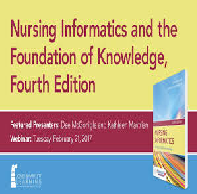The Nursing Informatics and Foundation of Knowledge Order Instructions: NR-512 NURSING INFORMATICS
Readings are as follows:

McGonigle, D. & Mastrian, K. (2015). Nursing informatics and the foundation of knowledge (3rd ed.). Burlington, MA: Jones and Bartlett.
•Chapter 6: Overview of Nursing Informatics (review)
References
Hardiker, N. & Nagle, L. (2015). Information and knowledge needs of nurses in the 21st century. In D. McGonigle & K. Mastrian (Eds.), Nursing informatics and the foundation of knowledge (3rd ed.). Sudbury, MA: Jones and Bartlett.
Matney, S. & Lundberg, C. (2013). The role of standardized terminology and language in informatics. In T. Hebda & P. Czar (Eds.), Handbook of informatics for nurses and healthcare professionals (5th ed.) (pp. 295–323). Upper Saddle River, NJ: Prentice-Hall, Inc.
Schwirian, P. W. (2013). Informatics and the future of nursing: Harnessing the power of standardized nursing terminology. Bulletin of the Association for Information Science and Technology, 39(5), 20–24. Retrieved from http://www.asis.org/Bulletin/Jun-13/JunJul13_Schwirian.pdf
Page or paragraph numbers must be included with quotes per APA. See APA re how to format references and in-text citations i.e. capitalization issues and use of the ampersand versus the word (“and”).
Including at least one in-text citation and matching reference.
Check for grammar and spellings
Discussion: Impact of Standardized Terminologies on Practice (graded)
How would a standardized terminology (of your choice) directly impact your nursing practice? Provide a rationale and one example.
The course outcome guiding our discussion this week is:
CO 4: Assess the value of standardized terminologies in supporting nursing in all four practice settings. (POs 5, 11)
——-
Consider how that choice of Standardized Terminology (in TD1) directly impacts your practice.
Any standard terminology helps in the information exchange at the local, national, and international levels. In this Discussion thread, apply the concept of standard terminology to your own practice. Using the standardized terminologies we identified from the first discussion, which one did you choose to adopt? As my practice area is education, I would be very likely to adopt the NANDA Diagnoses and Classifications as they provide the framework for clinical care plans and concept map development. Many of you may utilize this classification system in your clinical practice area as well.
Provide a rationale and support for your response and at least one example. Also, think in the back of your minds, how standardization would help with the output of information of an Electronic Health Record.
Remember that the impact on practice could be patient outcome related, or perhaps it might be related to nursing workflow, communication, cost, nurse satisfaction, retention, and/or training, etc. I am very much interested in your thoughts and applications on this topic. As you write your posts, please remember to include evidence-based research, scholarly evidence, and/or a citation from your textbook.
The Nursing Informatics and Foundation of Knowledge Sample Answer
The field of nursing has always faced a significant challenge on how to differentiate the contributions of nursing to patient care from those of medicine. As a result, practicing nurses have been challenged to understand why it is necessary to document patient care using standardized languages, especially now as several institutions are shifting toward using electronic documentation (ED). Actually, it has been proven that it is not possible for any organization to implement ED use without having a clear standardized language to illustrate the key elements of the care process (Tastan et al., 2014).
According to Brown et al. (2013), standardize terminologies have played an integral role in the field of nursing. For instance, they have been used to particularly to identify the impact of nursing in patient care and establish the most suitable way of incorporating components of nursing care into the electronic health record (EHR). It has also been used to identify the best documentation that illustrates and assesses patient care quality.
Standardized terminologies also have several essential and necessary advantages. For instance, they aid in improving communication among healthcare providers, they promote visibility of nursing intervention and the consequential outcomes of patients (Matney and Lundberg, 2013). Moreover standardized terminologies improve the quality of patient care, promote close adherence to standard practice procedures, and further the agenda of nursing research by producing data about patient care in a manner that is consistent (Schwirian, 2013).
The standardized terminology of my choice is NOC. This is a significant standardized terminology in my practice because it helps me determine interventions and outcomes among children with acute abdomen in my area of practice. NOC aids me to recognize these children’s chief complaints, and the most frequent etiology. This terminology is also essential in describing the decrease factors such as symptom persistence, symptom intensity, symptom frequency as well as the associated acute abdomen discomfort.
The Nursing Informatics and Foundation of Knowledge References
Brown, G. D., Patrick, T. B., & Pasupathy, K. S. (Eds.). (2013). Health informatics: a systems perspective.
Matney, S. & Lundberg, C. (2013). The role of standardized terminology and language in informatics. In T. Hebda & P. Czar (Eds.), Handbook of informatics for nurses and healthcare professionals (5th ed.) (pp. 295–323). Upper Saddle River, NJ: Prentice-Hall, Inc.
Schwirian, P. W. (2013). Informatics and the future of nursing: Harnessing the power of standardized nursing terminology. Bulletin of the Association for Information Science and Technology, 39(5), 20–24. Retrieved from http://www.asis.org/Bulletin/Jun-13/JunJul13_Schwirian.pdf
Tastan, S., Linch, G. C., Keenan, G. M., Stifter, J., McKinney, D., Fahey, L., … & Wilkie, D. J. (2014). Evidence for the existing American Nurses Association-recognized standardized nursing terminologies: A systematic review. International journal of nursing studies, 51(8), 1160-1170.




